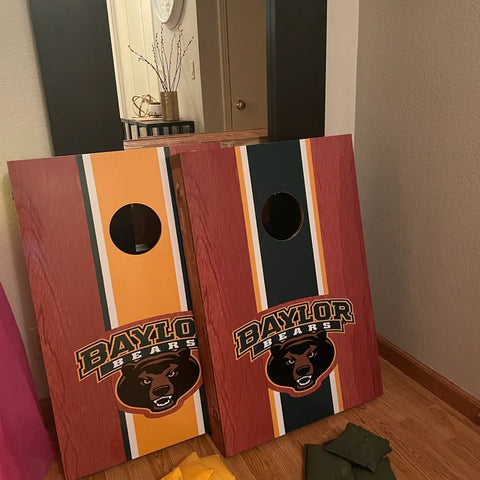Are you a fan of backyard barbecues, tailgating, or just drinking beer and tossing bean bags with friends? If you haven't already, it's time to upgrade your cornhole skills and step into the world of competitive cornhole. This popular game has transformed into a legitimate sport that requires skill, strategy, and intense concentration. So, let's dive deep and find out what competitive cornhole is all about.
What is Competitive Cornhole?
If you think cornhole is just a backyard game, think again. Competitive cornhole has become a serious sport with professional players, national championships, and even cash prizes. Players stand 27 feet apart and toss bean bags onto a raised platform with a hole in the center. The goal is to land the bags in the hole or on the board to earn points. The team that scores 21 or more points wins. Simple, right? But don't be deceived. Competitive cornhole requires accuracy, strategy, and skill.
The history of competitive cornhole is as intriguing as the game itself. While cornhole's origins are debated, its rise as a competitive sport is a more recent phenomenon. In the early 2000s, the sport started to gain traction in America's Midwest, with Cincinnati often hailed as the "Cornhole Capital." The American Cornhole Organization (ACO) was established in 2005, marking the beginning of the sport's professional era. The ACO not only standardized the rules but also commenced holding national championships, thus elevating the backyard pastime to a serious competitive sport. Today, cornhole tournaments are broadcasted on major sports networks, and top players can earn significant cash prizes, demonstrating the sport's meteoric rise in popularity and the recognition of cornhole as a legitimate competitive sport.
The Rules of Competitive Cornhole
Competitive corn hole game rules are a must. The basic rules are similar to the traditional game, but there are some notable differences. Players must stand behind the pitching area and throw the bags underhanded. The bags can't touch the ground or any other part of the court before hitting the board. Players must also alternate pitching bags from inning to inning. These are just a few of the rules, but they can be adjusted depending on the level of competition.
Specific Rules of Professional Cornhole Tournaments
In a professional cornhole tournament, the game is played in innings and each team gets four pitches per inning. The teams alternate turns beginning with the team who scored last.
One significant rule is the cancellation scoring method. In this system, the points of one player cancel out the points of their opponent. For example, if Player A scores 3 points in a round and Player B scores 2, then Player A is awarded 1 point.
Players are also prohibited from crossing the foul line before the bag they've thrown has landed. Doing so can lead to the throw being deemed foul and no points being awarded for that particular pitch.
The pitch has to be an underhand throw and the bags must be pitched within a 20-second time limit. If a player pitches out of turn, the bag will be considered foul and removed from the court before play continues.
As for the scoring, a bag that goes through the hole scores 3 points, while a bag that lands and remains on the board scores 1 point. If a bag touches the ground before landing on the board, it is removed and doesn't score any points. The first team to reach or exceed 21 points wins the game.
These are just a few of the rules that professional cornhole players must follow. Understanding these rules is imperative not only for serious competitors but also for casual players who wish to appreciate the complexity and strategic demands of the game.
What Makes a Great Cornhole Player?

Cornhole might seem like an easy game, but mastering the art of cornhole takes time and dedication. Being a great cornhole player requires the development of several key skills. First and foremost is accuracy. Consistently landing your bag on the board or in the hole is the primary objective in cornhole, and this requires a fine-tuned aim. The best players often spend numerous hours practicing their pitches, refining their aim and optimizing their throwing technique.
Another essential skill is strategic thinking. A good cornhole player must not only think about their throws but also about their opponent's potential moves. They must be able to anticipate the other team's strategy and adjust their gameplay accordingly. This can involve offensive moves, like aiming for the hole to score maximum points, or defensive ones, like blocking the board with your own bag to prevent your opponent from scoring.
Consistency is another crucial skill in cornhole. It's not enough to make a few good throws; players must be able to perform consistently over the course of a game. This requires physical endurance, mental stamina, and the ability to maintain focus and composure even under pressure.
Lastly, adaptability is key to being a great cornhole player. Every game is different, and players must be able to adapt to changing conditions on the fly. This could be changes in the weather that affect the pitch of the bags, or changes in the game situation that require a shift in strategy. Being able to adjust your game plan and execution quickly and effectively is a hallmark of a great cornhole player.
The World of Competitive Cornhole
Cornhole has exploded in popularity in recent years, with the American Cornhole League (ACL) leading the charge. The ACL hosts major tournaments throughout the year, including regional and national competitions. The league has also secured major partnerships with ESPN and other broadcasters to bring the sport to a wider audience. Competitive cornhole has evolved from a backyard game into a legitimate sport that requires strategy, skill, and practice.
Further Growth of Competitive Cornhole
The world of competitive cornhole continues to grow and evolve every day. This once humble backyard game has caught the attention of sports fans worldwide, and its competitive scene is experiencing rapid expansion. With the establishment of leagues such as the American Cornhole League (ACL) and the American Cornhole Organization (ACO), the sport has gained a structured platform that allows it to flourish.
There are now local, regional, and national tournaments that draw in thousands of players and spectators. The stakes are high as the winners not only earn bragging rights but also hefty cash prizes. The sponsorship deals with major brands and partnerships with broadcasters such as ESPN have brought the sport into the mainstream.
The sport’s accessibility adds to its appeal. All you need to play is a cornhole board, bean bags, and a competitive spirit. This makes the sport inclusive and allows for wide participation.
One of the best parts of competitive cornhole is the community. The community surrounding competitive cornhole is welcoming and passionate. Many players form teams and travel together to compete in tournaments, cultivating a sense of camaraderie. Additionally, fan clubs and online forums provide spaces for enthusiasts to share strategies, discuss tournaments, and connect over their love for the game.
The future of competitive cornhole looks promising as the sport continues to gain recognition and attract more players. It serves as a testament to the fact that with the right amount of passion and dedication, even a simple game can transform into a thrilling competitive sport.
How to Get Involved in Competitive Cornhole
If all this talk about competitive cornhole has piqued your interest, you might be wondering how to get involved. The first step is to find a local league or club that holds regular competitions. Start practicing regularly and connect with other players to learn the official corn hole rules. You can also watch televised cornhole tournaments to improve your strategy and learn new techniques. Who knows? You might be the next great cornhole champion.
Breaking into the World of Professional and Competitive Cornhole
For those who desire to take the leap into professional and competitive cornhole, the journey can be exciting and rewarding, but it needs a genuine commitment. It all starts with honing your skills. Regular practice is not just about perfecting your technique, but also about understanding the game's nuances and developing your unique playing style.
Participating in local cornhole tournaments is a great way to get a feel for the competitive atmosphere and put your skills to the test. It provides opportunities to observe seasoned players, understand their strategies, and gain practical insights. These tournaments are often frequented by scouts and representatives from larger leagues, making them a potential platform for you to showcase your abilities.
Networking within the cornhole community can also open doors to the professional sphere. Join a local club or online forum, connect with other players, and don't hesitate to seek advice or mentorship from the more experienced. These communities are typically welcoming and are a rich source of knowledge and support.
Reaching the professional level often means catching the attention of organizations like the American Cornhole League (ACL) or the American Cornhole Organization (ACO). Consider participating in their sanctioned tournaments, which range from regional to national levels. Success in these competitions can lead to ranking, recognition, and the chance to compete in the major leagues.
Remember, becoming a professional player requires patience and persistence. It may take time to see progress, but each step brings you closer to the professional cornhole world. Stay motivated, continue to learn and grow, and most importantly, enjoy the process. As you journey into the competitive scene, remember that cornhole is not just a thrilling sport, but also a game that brings people together and creates lasting memories.
Deep Dive Complete
Cornhole isn't just a game anymore; it's a sport that's gaining popularity nationwide. Competitive cornhole requires patience, skill, and strategy, making it a challenging and rewarding activity for those who enjoy competition. With local leagues and national tournaments, there are plenty of opportunities to get involved and unleash your inner athlete. Don't miss out on the fun; it's time to step up to the board and show off your skills.
